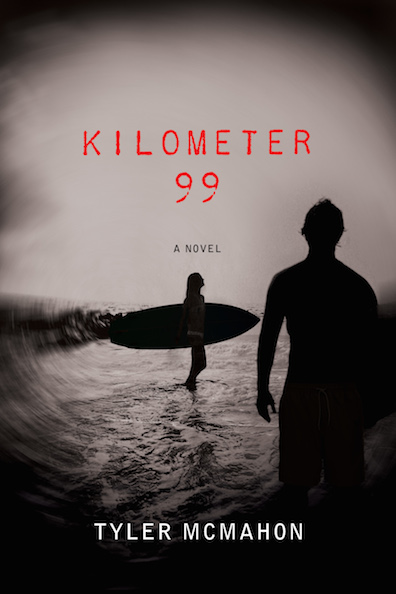It starts with a near perfect barrel ride at a Salvadoran surf break, closed out in a heap of whitewash and a heavy dose of foreshadowing. With short chapters that pile on quickly and often end with a cliffhanger, Kilometer 99 is a fast-paced read about a young Peace Corps engineer from Honolulu. The no-fuss writing and girl-abroad theme initially suggest a charming beach read; however, it is no delightful traveler’s escape to El Salvador, no feel-good Eat, Pray, Love. Local writer Tyler McMahon’s prose instead swiftly builds the setup for an adventure that tragically devolves shortly after the scene is set.
The plot centers on Malia, nicknamed “Chinita” by a Salvadoran crackhead, a Peace Corps volunteer who headed to El Salvador for a chance to see the world. Instead, she finds herself faced with widespread destruction after an earthquake racks the country, her nearly completed water project destroyed. She and her boyfriend decide to cash out and take a surf trip around South America, only to get waylaid by a mysterious bumbling foreigner who pulls them into increasingly shadier deals.
Surf sessions and flashbacks are McMahon’s relief devices—if it weren’t for them, both Malia and the readers would walk away. McMahon’s writing stumbles slightly over a few bits of dialogue and a sex scene in which he compares a man’s bearded face with the rubbery muzzle of a horse; while the references to O‘ahu and Hawaiian words are nice to read, they can feel forced. Instead, it’s in the descriptions of the surf sessions, the vividness of El Salvador, and the intense moments when things get progressively worse that McMahon’s writing shines.
His protagonist Malia is a well-developed character far from the virginal victim trope still found in many novels (think 50 Shades of Grey)—instead, she is an empowered, multi-faceted young woman who at times is easy to loathe, share frustrations with, and completely understand. When a second earthquake hits El Salvador after her passport and money have been stolen—her plans to wander South America with her boyfriend shattered, and her faith in humanity and herself forcibly deconstructed—she picks up a surfboard and heads for the ocean. “I realize then, or remember perhaps, that the surfer’s idea of perfection is different from everyone else’s,” Malia narrates. “It isn’t abstract or inscrutable, some shadow on the wall of a cave. We know what it feels like—perfection—how it looks and the sound it makes.” Only when she realizes the contrast of this paradise and the hell on land does she turn around to help.
Kilometer 99 feels like riding a train already off its tracks, and McMahon never veers. McMahon, a professor of English at Hawaii Pacific University who was a Peace Corps volunteer in El Salvador, creates an engaging narrative spiced with convincing details, from local Salvadoran food and architecture to the types of characters found in a seaside town infected by crack cocaine. In this quick read, El Salvador flashes by the window. Kilometer 99 is more destination than escape—it’s a novel, after all—and one worth visiting. Just know that it’s OK to take a surf break just as Malia does when her life is too much to handle.
Kilometer 99: A Novel
By Tyler McMahon
Released June 2014.
352 pp. St. Martin’s Griffin. $15.99.

